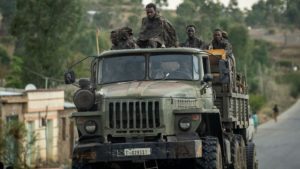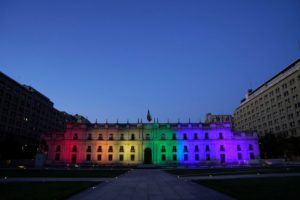A Russian draft treaty called for NATO’s written promise not to expand eastward, as well as to stop its military activity in post-Soviet countries. These demands were immediately rejected by NATO officials. In a recent video-call, US President Biden warned Russian President Vladimir Putin that there will be harsh economic consequences if Russian aggression were to continue. Russia has made it clear that Ukraine is a “red line” it would not like the West to cross. Meanwhile, German Economic Affairs and Climate Action Minister Robert Habeck threatened to halt the “Nord Stream 2” Russian gas pipeline project in case of a Russian attack.
The draft treaty was made in response to the growing tensions around the Russia-Ukraine border. Until now, Russia has up to 70,000 troops at the border, increasing fears of a Russian military invasion of Ukraine. NATO officials stated on December 17 that they would be very open to moving more troops towards Russia if Putin were to make a move into Ukraine. The draft demanded that the Organization cancel the 2008 Bucharest Declaration, a promise made to Georgia and Ukraine to eventually include them in NATO. On December 16, NATO’s Secretary General invoked the promise in a meeting with Ukrainian President Volodymyr Zelensky.
Russia’s proposal also reminded NATO of a spoken guarantee, made in 1990 to the fallen Soviet Union by then US Secretary of State James Baker. According to Russia, Baker assured the former Soviet President Mikhail S. Gorbachev that NATO would not expand to the east. This was first broken in 1999, when the Czech Republic, Poland and Hungary joined the Organization. However, recent interviews with Gorbachev and Baker saw both men affirm that this promise was only in reference to East Germany, as opposed to Eastern Europe in general.
A recent memory that stokes the West’s fears is Russia’s 2014 annexation of Crimea, a peninsula south of mainland Ukraine. NATO members still see this land as “occupied territory” but Putin considers the territory to be Russian. He also considers Russians and Ukranians to be “one people” due to historical and ethnic ties. After a mostly private call between US President Joe Biden and Vladimir Putin on December 7, US National Security Adviser Jack Sullivan told reporters “I will look you in the eye and tell you, as President Biden looked President Putin in the eye and told him today, that things we did not do in 2014, we are prepared to do now.”
The current US Secretary of State, Antony J. Blinken, made it clear that the Russia-Ukraine crisis is about more than Ukrainian sovereignty for the Biden administration. On December 12, Blinken made an appearance on US television network NBC, where he stated “there is something even bigger at stake here, and it’s the basic rules of the road of the international system, rules that say that one country can’t change the borders of another by force.” Former NATO officials say the US is attempting to set an international precedent, in order to deter China from a potential attack on Taiwan.
As Russia keeps building up troops at its Western border and US intelligence predicts numbers to rise over 200,000, Europe, NATO and Ukraine hang in the balance. It remains to be seen whether continued dialogue will cool down the disputed region.






